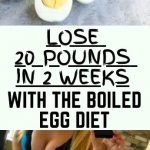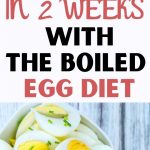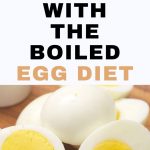You may have come across discussions about the Boiled Egg Diet online, often accompanied by claims of rapid weight loss. While the idea of using eggs as a primary food for weight loss might sound unusual, this diet has gained some popularity as a short-term strategy.
It’s important to understand from the outset that the Boiled Egg Diet is a highly restrictive, low-calorie, and low-carbohydrate plan. It is designed for short-term use only and is not considered a sustainable or healthy approach for long-term weight management. Claims of losing significant amounts of weight (like 20 pounds in 2 weeks) are often unrealistic for true fat loss and typically reflect temporary water weight reduction.
This overview explains the typical structure and components of the diet, along with crucial considerations.
What is the Boiled Egg Diet?
The Boiled Egg Diet centers around consuming boiled eggs as a main source of protein. While variations exist, the core principles generally involve:
- Emphasis on Boiled Eggs: Requiring at least two to three boiled eggs per day.
- Lean Protein: Including other sources like chicken, fish.
- Non-Starchy Vegetables: Such as leafy greens, broccoli, bell peppers.
- Limited Fruit: Often restricted to low-sugar options like citrus fruits, usually once a day.
- Exclusion of Many Foods: Typically eliminates snacks between meals, sugary drinks, processed foods, bread, pasta, and higher-carb fruits and vegetables.
- Hydration: Allowing only water or other zero-calorie beverages.
- Short Duration: Usually intended to be followed for a period of two weeks.
How Does It Typically Work?
The diet follows a strict meal plan with only breakfast, lunch, and dinner permitted. There are no snacks allowed. The structure forces a significant reduction in calorie and carbohydrate intake, relying heavily on protein from eggs and other lean sources to promote satiety.
A typical day on this diet might look something like this (note: this is illustrative, not a specific recommendation):
- Breakfast: 2 boiled eggs, 1 citrus fruit (like grapefruit or orange).
- Lunch: A large salad with grilled chicken or fish (no creamy dressings).
- Dinner: Steamed vegetables with another serving of lean protein (like fish or chicken), or sometimes 2 boiled eggs with a salad.
The specific combinations vary slightly day-to-day within the diet’s framework, but the core components remain consistent and limited.
Potential Drawbacks and Important Considerations
Before considering such a restrictive plan, it’s crucial to be aware of the potential downsides:
- Extreme Restrictiveness: The diet eliminates many food groups, making it monotonous, difficult to stick to, and socially isolating.
- Nutritional Imbalance: While eggs are nutritious, relying so heavily on a few food types can lead to insufficient intake of fiber, certain vitamins, and minerals if followed for longer than intended. It lacks the variety needed for overall long-term health.
- Unsustainability: This is not a lifestyle change. It doesn’t teach balanced eating habits. Most weight lost is likely water weight, and regaining the weight is highly probable once normal eating patterns resume.
- Unrealistic Expectations: As mentioned, rapid fat loss claims are misleading. Sustainable fat loss is a much slower process.
- Potential Side Effects: Such a low-calorie, low-carb approach can lead to fatigue, headaches, constipation (due to low fiber), and potentially bad breath.
The Role of Eggs
Eggs themselves are indeed a nutritious food. They are an excellent source of high-quality protein, vitamins (like D and B12), and minerals (like choline and selenium). Incorporating eggs into a balanced and varied diet can certainly be part of a healthy eating pattern. However, the Boiled Egg Diet takes this to an extreme by making them the centerpiece of a highly restrictive plan.
Conclusion
The Boiled Egg Diet is a very restrictive, short-term eating plan focused on low-calorie, low-carbohydrate intake, primarily through boiled eggs, lean protein, and limited vegetables. While it might lead to temporary weight loss (mostly water), it is not a balanced, sustainable, or recommended approach for long-term health or weight management.
For lasting results, focusing on well-rounded eating patterns that include a variety of food groups, portion control, regular physical activity, and healthy lifestyle habits is essential. Sustainable weight loss is about creating habits you can maintain for life, not just for two weeks.



